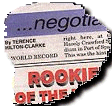

T&T's bid not important to Euro clubs
By
TERENCE HILTON CLARKE
(c)copyright
![]()
THIS week’s World Cup-qualifying tie with Panama marks the official end of the “freeness” for coach Ian Porterfield.
By freeness, I mean the relatively trouble-free access that he had to his top players over the past two months – devoid of any hassle from European-based clubs. The term “official end” is used because the end actually started about two weeks ago.
That was when the football season in western Europe got underway, bringing promises of renewed excitement for football fans around the world: and also renewed headaches for local football officials and European club coaches alike. Already, there has been one casualty of sorts: Anthony Rougier, who was transferred to English Second Division club, Reading, upon request; following an irreparable rift between himself and Port Vale manager Brian Horton. There had been problems aplenty during last season, with the Port Vale management growing upset at Rougier’s absences through national duty. The imbroglio flared up again last week with Horton making a plea to Rougier to skip the Panama game. Rougier would not bend and asked to be transfer-listed: within five days, he was playing for Reading against Millwall in the 2000-01 season opener.
While it is hoped that there will be no more bitter endings, it is likely that similar circumstances are likely to crop up after this week. Manchester United, seeking a seventh Premiership title in nine years, plus another UEFA Champions’ League crown, are not going to fully relish the prospect of star striker Dwight Yorke spending the first half of this season (and possibly the whole of next year) pursuing a World Cup-place with Trinidad and Tobago. Such reservations are likely to be equalled at Hibernian (Russell Latapy, Lyndon Andrews), Raith Rovers (Marvin Andrews) and Chester City (Angus Eve).
The level, to which resentment of third-world players leaving to represent their countries in international competition has risen, can be summed up in the case of VfL Wolfsburg’s Jonathan Akpoborie. The German club flatly refused to release the Nigerian to play for his country in the Olympic Games in Sydney, citing the fact that he missed the first week of training because of international duty, returning in “very poor physical condition.” Wolfsburg coach, Wolfgang Wolf said, “I know how important it is for Johnny to play for his country but I think it would be better if he ended his international career.”
As pointed out before, it seems that such actions are rooted in a Euro-centric view that denies a label of importance being attached to competitions such as the Asian Cup and the Gold Cup. However, it now seems that certain clubs, which are unable to come to terms with the fact that there are players on their rosters who are obligated to play for their countries when the time arises, are now dismissing the African Nations’ Cup, Olympic Games and even the World Cup. These teams are now pressuring their players to stay: rather than having to face the prospect of losing these individuals at what are deemed to be inopportune times, especially if that person should pick up an injury while representing his country.
It would seem that such risks are merely part and parcel of the game, and that the clubs should not spend so much time obsessing over such things. After all, the clubs have never made a sound about their European players representing their countries? Which brings us back to the point that there is a lesser level of regard given to the interests of non-European players. FIFA have tried to appease the clubs over the years, with the latest effort being the campaign to unify the international football calendar. One of the proposals is that all national team games around the world – be they friendlies or competitive games – be staged at the same time, during a certain period. That way, all the designated players, both European and non-European will leave and return together and there will be less of a chance of coaches tearing their hair out.
But, this is a long way off and, for now, the clubs versus country saga is set to continue through this new season and there are sure to be a series of rumblings over the next eight months or so. This is the situation that both coach Porterfield and the TTFF are going to be facing after this week. Let’s hope that they have trained properly for the hard battle that lies ahead.




